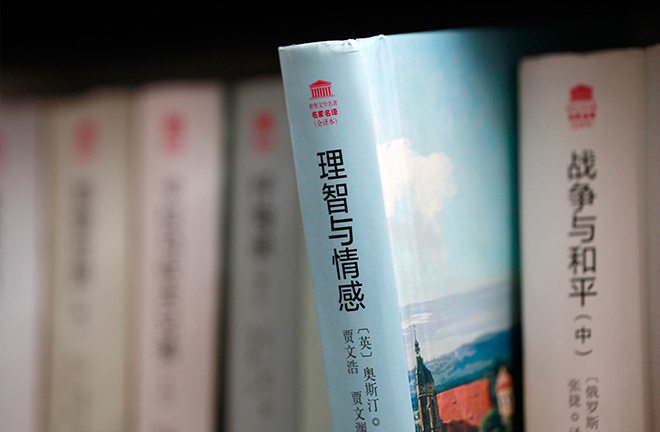Foreign literature examined from global vision

Sense and Sensibility, among other world-famous novels, at a library in Anyang, Henan Province Photo: CFP
On Dec. 11th, the 11th National Council of the Chinese Association of Studies of Foreign Literature and the Seminar on Foreign Literature Studies in Global History were held concurrently via video links. In the context of globalization, how to give full scope to the role of foreign literature studies in China and deepen exchanges and mutual learning among civilizations has triggered reflections among scholars.
Global vision
Observing foreign literature from a global perspective and unveiling the universal laws and basic principles of literary development are of great benefit to China’s foreign literature studies. Han Guohe, vice president of Zhengzhou University, pointed out that global history highlights cross-cultural, cross-regional, and cross-ethnic interactions, enriching our understanding of world history. It also provides new theoretical horizons for exploring the worldwide production and flow of literary knowledge, literary education, and aesthetic ideas.
“Global history offers a decentralized cognitive model of relations,” said Cheng Wei, president of the Chinese Association of Studies of Foreign Literature. It may enable China’s foreign literature studies to break away from the Western-centric cognitive model of world history, and to realize that literary texts are not a slide under a microscope, but “walking” discourses inextricably linked in the complex relationship of the historical process.
Global history is of methodological significance to literary studies. Jiang Chengyong, vice president of the Chinese Association of Studies of Foreign Literature, said that reviewing Western literature from the history of natural sciences and civilizational development contributes a literary research topic with global historical significance.
Li Weifang, a professor from the College of Chinese Language and Literature at Henan University, suggested dealing dialectically and rationally with the relationship between economic globalization and cultural diversity. Scholars ought to promote effective communication, equal dialogues, mutual understanding, and complementarities between diverse cultures and literatures of Eastern and Western countries, creating an inclusive, tolerant, and rational academic atmosphere. Comparative literature studies should be fully utilized as a bridge for cross-cultural dialogue, making their due academic contributions to realizing the harmonious ideal of a human community with a shared future.
Cross-disciplinary studies
With the development of foreign literature studies and the construction of new liberal arts, interdisciplinarity has become an important trend in the study of foreign literature in China.
Area studies are one of the five research directions under the first-level discipline of foreign languages and literatures. The Catalog of Graduate Education Disciplines and Majors (2022) lists area studies as a first-level discipline under the interdisciplinary category. In the views of Peng Qinglong, a professor from the School of Foreign Languages at Shanghai Jiao Tong University, foreign literature studies are inseparable from area studies. Scholars should not only examine foreign literature from the perspective of aesthetic art to understand its essence, but also develop deep insight into the changing patterns of psychology, character, and spiritual maps of the target country, region, or nation, so as to serve academic research and advise politics.
Qiu Yafen, a research fellow from the Institute of Foreign Literature at the Chinese Academy of Social Sciences, has long been engaged in Japanese literary studies. In her opinion, area studies attach importance to disciplinary integration. For Japanese literature researchers, actively introducing social and historical perspectives can effectively break the prevailing research paradigm of “the internal of texts,” restore literary texts to the historical and cultural context they generate, and confirm each other with contemporary materials of intellectual and cultural history.
Regional culture refers to the unique cultural ecosystem formed in a certain regional space. It interweaves multiple factors of physical geography and historical culture, and shapes the spiritual world and historical traditions of the people within a specific space and time, granting distinct features to literature and other intellectual creations in this region. Wang Lixin, a professor from the College of Chinese Language and Culture at Nankai University, noted that incorporating the concept of regional culture provides enlightenment to the interdisciplinary study of foreign literature. Regional culture focuses on its effective association with specific literary objects, while the interdisciplinary approach tends to uncover the hidden content of general literary research.
Ethical literary criticism is a critical theory and method that understands the ethical nature and didactic function of literature from an ethical perspective, and on this basis reads, comprehends, analyzes, and interprets literature. Su Hui, a professor from the School of Chinese Language and Literature at Central China Normal University, believes that the humanities need to enhance their ability to cope with new situations in the era of rapid scientific, technological, and social development. Its interdisciplinary nature places more responsibility on ethical literary criticism to leverage extensive theoretical resources, so as to break disciplinary barriers, explaining new phenomena through mutual learning and integration between literature and other disciplines. It is advisable to integrate ethical literary criticism with narratology, memory theory, and eco-criticism, and conduct multidisciplinary research combining philosophy, psychology, sociology, and even natural sciences, to provide solutions to the common problems facing humanity, and contribute to the construction of a human community with a shared future.
In recent years, the foreign literary circle has begun to construct its own discourse system. For instance, the concepts of “covert progression” and “dual narrative dynamics” initiated by Shen Dan, director of the Faculty of Humanities at Peking University, have been applied by Western academia. In Shen’s view, constructing China’s theoretical discourse of foreign literature calls for the courage to initiate our own theories and revise the theories of Western scholarly authorities in a bid to gain greater academic discourse power in the international arena.
Edited by YANG LANLAN

 PRINT
PRINT CLOSE
CLOSE